![]()
Mon, April 30, 2012 | By Gareth H. Jenkins
This article was first published in the Turkey Analyst, vol. 5 no. 9 (www.turkeyanalyst.org), a biweekly publication of the Central Asia-Caucasus Institute & Silk Road Studies Program Joint Center. © Central Asia-Caucasus Institute & Silk Road Studies Program Joint Center, 2012.
On April 22, 2012, hundreds of thousands of people gathered in the center of Diyarbakır, the largest city in the predominantly Kurdish southeast of Turkey, for a celebration of the Prophet Muhammad’s birth. The event was organized by a coalition of NGOs affiliated with the radical Sunni Islamist organization known in Turkey as Hizbullah (which is unrelated to the Lebanese Shia organization with the same name), which many assumed to have been crippled by the killing of its founder Hüseyin Velioğlu in January 2000. However, Hizbullah’s ability to mobilize such a huge number of people suggests that it has not only recovered but is now stronger than ever. Its ability to combine a strong commitment to conservative Islamic values with an advocacy of Kurdish cultural and political rights looks set to pose a serious challenge not only to the ruling Justice and Development Party (AKP) but also to more secular Kurdish organizations such as the Peace and Democracy Party (BDP) and the militant Kurdistan Workers’ Party (PKK).
Background
Hizbullah traces its origins back to 1979, when Velioğlu began holding meetings with a small number of radical Islamists in his native province of Batman in southeast Turkey. But it was only when Velioğlu relocated to Diyarbakır in the 1980s that Hizbullah started to become a mass movement. Velioğlu’s ultimate aim was the creation of an Islamic state based on Shari’a law and encompassing all Muslims in a single polity similar to the one established by the Prophet Muhammad. But he initially concentrated on building a support base in southeast Turkey and the vast majority of Hizbullah’s members were — like Velioğlu himself — ethnic Kurds. As a result, Hizbullah soon became regarded as a rival by the PKK, which had long claimed to be the sole representative of Turkey’s Kurdish minority.
In June 1992, the PKK killed ten Hizbullah sympathizers in the village of Yolaç in Diyarbakır province. The attack triggered a vicious war between the two organizations in which at least 700-800 people were killed. Eventually, the PKK tacitly acknowledged defeat in its attempt to eradicate Hizbullah and ceased its attacks. Although there was no formal ceasefire or peace agreement, by 1995 the war was effectively over. Starting in late 1992, Hizbullah had also begun targeting rival Islamist organizations in southeast Turkey, particularly a group known as Menzil. Hizbullah later insisted that it had been acting in self-defense but there is no evidence that Menzil — over 200 of whose members were killed — initiated violence or had the means to do so.
By the late 1990s, Hizbullah’s growing influence and the continuing death toll from clashes with rival Islamist groups led to increased pressure from the Turkish security forces and a sharp increase in arrests of the organization’s members in southeast Turkey. In June 1999, Velioğlu relocated to Istanbul. On January 17, 2000, Velioğlu was killed and the organization’s archives were seized in a police raid on a Hizbullah safe house in the Istanbul suburb of Beykoz. In addition to computer disks containing over 20,000 CVs, the police found what they described as over 350 video recordings of interrogations of people captured by Hizbullah, many of whom had been tortured and executed. Over the next two weeks police detained 940 suspected Hizbullah members in 44 provinces across Turkey. The police also uncovered arms dumps and the remains of more than 60 people who had been buried in Hizbulllah safe houses.
Privately, Hizbullah members admit that mistakes were made and that sometimes the wrong people were killed. But they vehemently deny claims — particularly by secular Kurdish nationalists, Turkish leftists and more moderate Islamist groups — that Hizbullah was created and controlled by elements within the Turkish military; an accusation which is one of the main charges in Turkey’s notorious Ergenekon investigation.
There is considerable evidence to suggest that, in the 1980s and early 1990s in particular, the Turkish state — including the ostensibly secular military — actively encouraged the propagation of radical Islamic values and ideas in southeast Turkey as a bulwark against the then Marxist PKK. There also appear to have been instances in which individual members of the security forces, who were themselves engaged in a war with the PKK, provided Hizbullah militants with information on suspected PKK activists and made no attempt to investigate when the activists were subsequently assassinated. But there is little doubt that the primary driving force behind the creation and growth of Hizbullah was Velioğlu. Indeed, the Hizbullah archives make it clear that Velioğlu went to considerable lengths to prevent any attempted penetration of the organization by the security forces, including executing suspected police informers.
Implications
The killing of Velioğlu and the seizure of the computer archives dealt a devastating blow to Hizbullah’s ability to organize. In the two years after Velioğlu’s death, the police detained nearly 6,000 alleged members of the organization; while the publication of the gruesome details of its interrogations and the exhumation of some of its victims severely damaged its public image. But gradually Hizbullah has regained its strength.
Hizbullah members insist that Islam obliges them to engage in holy war, or jihad, under specific circumstances, but add that they do not believe that current conditions in Turkey meet these requirements. Instead, they have focused on building up their grassroots support through a network of NGOs. Most are concentrated in southeast Turkey although many also have branches in the west of the country. In addition, Hizbullah publishes books and magazines and has its own bookshops, a weekly newspaper, a radio station, satellite TV channel and numerous websites. Its NGOs are particularly active in underdeveloped areas, where they distribute aid to the poor, provide religious instruction through Qur’an courses and discussion groups and organize conferences and seminars on religious themes. In areas where it is particularly strong, Hizbullah now also plays a major role in trying to mediate solutions to issues as diverse as local disputes over land and water rights, blood feuds, elopements and disagreements within families.
No reliable data are available for the number of participants in the rally on April 22, 2012. The local police put the figure at 200,000 — itself an extraordinary figure in a city with a population of around one million — while the mainstream Turkish media estimated it at 400,000-500,000. Although Hizbullah is still regarded with fear by many in Turkey, the rally was characterized by a sense of joy and exuberant celebration. All of the speakers were affiliated with Hizbullah. Even if not all of the crowd were necessarily active Hizbullah supporters, few are likely to have been hostile to the organization.
There is little doubt that, in addition to its religious credentials, Hizbullah’s appeal to the local populace has been boosted by its outspoken calls for equal rights for both Kurds, including the use of the Kurdish language in the education system. It has also used Kurdish identity to try to undermine rival Islamist organizations, especially the vast network controlled by followers of the exiled preacher Fethullah Gülen (born 1941), which has traditionally been relatively weak in southeast Turkey but has recently been trying to increase its influence in the region. Although many of the activities of the Gülen Movement are informed by a strong Turkish nationalism, Gülen himself has long regarded an ethnic Kurd, Said Nursi (1878-1960), as his spiritual mentor. Hizbullah now uses this as part of its efforts to undermine the Gülen Movement — claiming Said Nursi as one of their own and stressing not only his ethnicity but the fact that he held considerably more radical ideas than those publicly espoused today by Gülen’s followers.
Under Velioğlu, Hizbullah was very introspective and had few contacts with foreign organizations. In recent years it has increasingly engaged with radical Islamists in other countries, particularly in the Middle East. There is a framed Palestinian flag and a photograph of the corpse of slain Hamas founder Sheikh Ahmed Ismail Hassan Yassin on the walls of the headquarters of Hizbullah’s main NGO, Mustazaf-Der (Association for Solidarity with the Oppressed). The rally in Diyarbakır on April 22, 2012 was attended by representatives from Islamist organizations in Iraq, Iran, Jordan and West Africa.
Conclusions
The Kurdish southeast of Turkey has traditionally been the most conservative area of the country. Perhaps the most damning indictments of the policies of successive government in Ankara has been that the once Marxist — and still very secular — PKK has been able to build a large support base in the region. In recent elections, those Kurds who have been unable to bring themselves to vote for the BDP — which is widely regarded by both its supporters and opponents as being closely aligned with the PKK — have tended to vote for the AKP.
Hizbullah members report that they are currently discussing whether or not to found a political party. Those in favor maintain that it would give religious Kurds an alternative to the AKP. Those against argue that, under the current circumstances, it would be very difficult for Hizbullah members to stand for election and engage in parliamentary politics without comprising their principles. However, given the continuing increase in Hizbullah’s influence in southeast Turkey, it is likely to be a question of when, not if, a party is eventually established.
The establishment of a political party would probably reduce the possibility of Hizbullah returning to violence of its own accord, but it could increase the risk of it once again being targeted by the PKK. In recent years, there have been a small number of attacks by PKK supporters against Hizbullah NGOs. After, PKK representatives have hastened to condemn the attacks and to reassure the Hizbullah leadership that they had no desire for a return to the bloodshed of the early 1990s. However, Hizbullah’s conservative values and strong sense of Kurdish identity would be a potent combination in any election and would almost certainly reduce the appeal of any party regarded as being affiliated with the more secular PKK.
It is also unclear how the AKP would react to Hizbullah’s formation of a political party. The AKP is already losing support in southeast Turkey as a result of its hard-line policies on the Kurdish issue. The appearance of a Kurdish Islamist party on the ballot paper would reduce the AKP’s electoral support in the region still further. Yet any attempt to crack down on a Hizbullah political party would risk not only a backlash from Hizbullah itself but could have fatal consequences for hopes of disarming the PKK. It is over a decade since Hizbullah last engaged in violence. On January 17, 2012, the twelfth anniversary of Velioğlu’s death, Hizbullah published a 17-page manifesto committing itself to seeking to achieve its aims through non-violence. Yet its supporters and those working in its NGOs are still being arrested and charged with “membership of a terrorist organization”. Under such circumstances it is not surprising that the PKK has responded with such skepticism to the AKP’s recent calls for it to lay down its arms; and it will hardly be encouraged to do so if the government also attempts to suppress a Hizbullah political party.
Gareth Jenkins, a Nonresident Senior Fellow with the CACI & SRSP Joint Center, is an Istanbul-based writer and specialist of Turkish Affairs.



 RSS
RSS

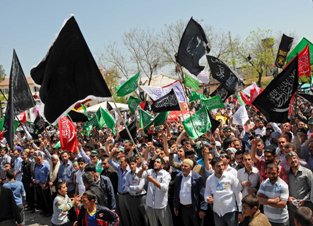
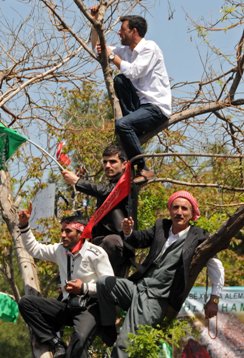
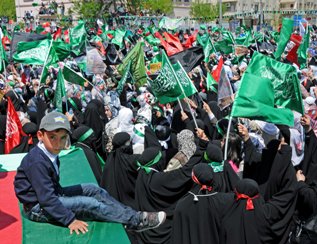
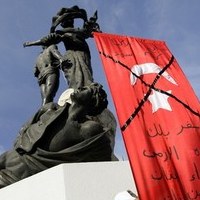
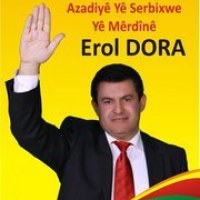

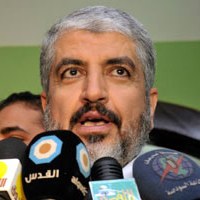
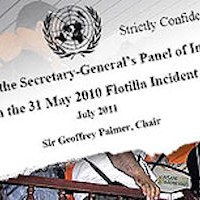




[…] and Kurdish nationalism, with the emergence of an Islamist, Kurdish party (see Turkey Analyst, April, 30, 2012) would be a game changer, rendering the religious card much less effective an antidote to Kurdish […]